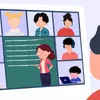In the early days of edtech, startups focussed on creating disruptive innovations in learning techniques by leveraging smart technology and facilitating virtual learning ecosystems mostly targeted towards Tier 1, IB board and English medium schools. This was followed by assisted learning tools that helped in building cognitive functions, through STEM learning, coding for kids and even basic AI and robotics.
Now, with the pandemic, edtech players are stepping up to meet the demand for continuous education for the masses, leading to another major challenge getting added to the digital divide – the language divide.
India has 22 languages, spoken by 96.71% of the population, and over 19,500 dialects, according to the Census 2011. In spite of this, English largely continues to dominate the web for the second largest internet user base in the world.
As per a study by KPMG and Google, Indian language internet user base is currently growing at a CAGR of 18%, as compared to 3% growth of English users. Further, 75% of India’s active internet users are going to access the web in Indian languages, surpassing the English user base by 2021. The report also states that Hindi internet users are going to outgrow the English user base, with Marathi and Bengali being the other two Indic languages to drive growth.
Another report, by Internet and Mobile Association of India (IAMAI) and Nielsen estimated that India has over 71 million children, in the age group of 5-11 years of age, that access the internet using devices of family members. Given this growth potential, it is high time the edtech startups and innovators give a serious thought to make regional language content accessible to the masses. Some of the key tools that are driving this change include:
Pre-recorded lectures in regional language
Having school teachers to record lectures in the regional language, which can then be accessed by children, is one of the simplest formats of teaching via online tools. Although not interactive, this allows for passive knowledge transmission and parents can then step in to support and help children learn, taking guidance from the recorded lectures.
Virtual classrooms conducted in regional language
Virtual classrooms are a step above the pre-recorded lectures, allowing interactive exchange between students and teachers.
Apart from allowing remote access to learning, virtual classrooms conducted on regional language can be as simulated to an actual classroom, helping children to learn, while being supervised by parents who can be equally involved in the learning process.
Translated modules
This is another comparatively simple mode of making textual content accessible in regional language. While the pre-recorded lectures and virtual classrooms are excellent audio-video modes of e-learning, translated study modules or notes in regional language can help drive the self-study and knowledge absorption for children.
Translation tools to decipher English content/words and vice versa
These can help not only students who use a regional language as a means of learning, but also for children using English as the primary medium of learning. Translation tools embedded in the e-learning module to offer complete or selective translations can also be of help to parents who are assisting children in studying at home.
Curated games in regional languages
Interactive and fun games are as much a part of learning as serious academic content. E-learning can help create innovative, curated games in regional languages that can help build cognitive and team work spirit among children, especially at a time when they are confined at home and devoid of physical interaction.
Customised content, specific to an education board locality
This can work wonders for children, making regional language e-learning, as mainstream as English. Making it a level playing field for both, English and regional language education formats, customisation of content as per education boards will help ensure equality in e-education opportunity across the country.
Train the trainer programs in regional languages: Teacher training is a crucial aspect when attempting an innovative e-learning module. While most teachers are generally trained for classroom teaching, they require special assistance to adapt to the newer e-learning formats, especially so when it is in regional language.
Communication with parents in their native language
While parents have always been a vital part of the learning ecosystem for children, e-learning has further put additional responsibility upon parents to ensure children are able to make the most out of e-classes. Communication with parents, especially those coming from a segment that does not converse fluently in English, therefore becomes a vital part of parent engagement.
System interfaces (apps, web, games) in local languages
Apart from the above, edtech innovators and service providers need to also look at creating friendly and supportive technology interfaces for children and parents using regional language as modes of learning and communication. For a holistic learning experience that is not plagued by an English language handicap, common interfaces like apps, websites and games need to have features that offer inclusivity to non-English language users.
The tools mentioned above have the potential to ease the digital divide, especially when it comes to edtech, for children and parents, and are vital in accelerating the growth of edtech. Supported by positive government policies, including the recent NEP which focuses on the development and digitisation of rural education system, other policies like Digital India, etc., offer a supportive framework for edtech service providers.
It is vital now more than ever before to curate an efficient, holistic and inclusive ecosystem for e-learning as we embark on a tech-enabled smart lifestyle, celebrating highest internet penetration, access to smart devices as well as innovations in emerging tech using IoT, AI and ML.
(Disclaimer: The views and opinions expressed in this article are those of the author and do not necessarily reflect the views of YourStory.)
Link : https://yourstory.com/2020/10/regional-languages-elearning-edtech-sector
Author :- Ashish Chaturvedi ( )
November 06, 2020 at 02:33PM
YourStory

